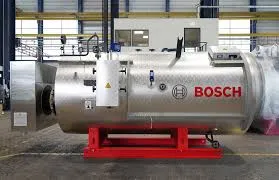
Sep . 07, 2024 19:16 Back to list
High-Quality Oil Fired Hot Water Boilers - Efficient Heating Solutions
Understanding Oil-Fired Hot Water Boilers
Oil-fired hot water boilers are an essential component in many heating systems, particularly in areas where natural gas is not readily available. These boilers use oil as a fuel source to heat water, which is then circulated throughout a building to provide warmth and comfort. Their efficiency and reliability have made them a popular choice in residential and commercial applications.
How Oil-Fired Hot Water Boilers Work
At the heart of an oil-fired hot water boiler is the combustion chamber, where oil is burned to produce heat. The fuel is usually delivered in liquid form and stored in a tank. When required for heating, the oil is pumped from the tank to the burner, where it is atomized and ignited. The resulting flames heat the water in the boiler, raising its temperature to the desired level.
The heated water is then circulated through pipes to radiators, baseboards, or underfloor heating systems, warming the spaces efficiently. Once the water has released its heat, it returns to the boiler to be reheated, creating a continuous cycle.
Advantages of Oil-Fired Hot Water Boilers
oil fired hot water boiler

One of the significant advantages of oil-fired hot water boilers is their ability to provide consistent and powerful heating. Oil has a high energy content, which means that it can produce a substantial amount of heat compared to other fuels. Additionally, these boilers are capable of heating large areas, making them suitable for larger homes and industrial applications.
Another benefit is the relative ease of maintenance. Modern oil-fired boilers are equipped with advanced technology that enhances their performance and durability. Routine maintenance involves regular cleaning of the burner and inspection of components, which can be managed by a qualified technician.
Environmental Considerations
While oil-fired hot water boilers are efficient, they do have environmental considerations. Burning oil releases carbon dioxide and other emissions, contributing to air pollution. However, advancements in oil combustion technology have led to cleaner burning fuels and more efficient units. Homeowners can also opt for biofuels or renewable oils to minimize their carbon footprint.
Conclusion
Oil-fired hot water boilers remain a reliable heating option for many. Their capability to deliver efficient heating solutions makes them a popular choice in various settings. As technology advances, these systems are becoming more environmentally friendly, allowing users to enjoy the comfort they provide while being mindful of their impact on the planet. Whether in a residential or commercial capacity, oil-fired hot water boilers continue to play a significant role in heating systems worldwide.
-
High-Efficiency Commercial Oil Fired Steam Boiler for Industry
NewsJul.30,2025
-
High-Efficiency Biomass Fired Thermal Oil Boiler Solutions
NewsJul.30,2025
-
High Efficiency Gas Fired Thermal Oil Boiler for Industrial Heating
NewsJul.29,2025
-
High-Efficiency Gas Fired Hot Water Boiler for Sale – Reliable & Affordable
NewsJul.29,2025
-
High Efficiency Biomass Fired Hot Water Boiler for Industrial and Commercial Use
NewsJul.29,2025
-
High-Efficiency Biomass Fired Hot Water Boiler for Industrial Use
NewsJul.28,2025
Related PRODUCTS






















